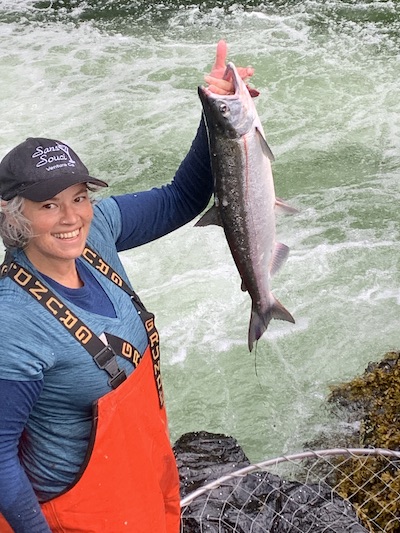UAS Faculty Forest Haven Successfully Defends Dissertation on Subsistence and Settler Colonialism in Alaska
Dr. Haven’s dissertation, “Alaska Native People, Traditional Foods, and the Settler State: ‘Subsistence’ and the Narrative of Settler Belonging” takes an in-depth look at the history of the subsistence in Alaska, tracing the legal, political, and social construction of this unique user group category.
Juneau, Alaska
Date of Press Release: April 13, 2023

University of Alaska Southeast Social Science faculty Forest Haven was awarded her Ph.D. in Anthropology from the University of California Irvine on December 2nd, 2022. Her dissertation committee chair was Dr. Kris Peterson, Professor of Anthropology at the University of California, Irvine.
Dr. Haven’s dissertation, “Alaska Native People, Traditional Foods, and the Settler State: ‘Subsistence’ and the Narrative of Settler Belonging” takes an in-depth look at the history of the subsistence in Alaska, tracing the legal, political, and social construction of this unique user group category. The subsistence category was created in the 1970s to regulate taking of fish and wildlife resources for personal or family consumption. However, the initial intent for developing this use category was to codify protection of Alaska Native peoples’ hunting and fishing rights after they were dissolved in the 1971 Alaska Native Claims Settlement Act (ANCSA). In the decades following ANCSA, several attempts were made at the state and federal level to codify a protection for Native traditional food practices, yet each was met with strong resistance by state legislators, national and local sport hunting and fishing organizations, and a vocal settler population. Through the mobilization of equal rights rhetoric, subsistence went from being a collective Alaska Native rights issue, to a liberal settler rights issue, giving all Alaska residents the right to practice subsistence. This dissertation thus analyzes the historic development and contemporary manifestations of the subsistence use category in Alaska, and within the context of U.S. settler colonial state-making processes.
“Dr. Haven's dissertation examines subsistence and food security, one of the most significant issues for Alaska Natives, today. Her perspective and call to action provides new insights and makes a contribution not only to scholarly works but to policy discussions for Alaska Native communities and people,” notes Dr. Dan Monteith, Associate Professor of Anthropology at UAS.
Data for this dissertation comes from ethnographic research conducted with Ts’msyen, Xaadaas, and Lingít traditional food experts, from various Alaska Department of Fish and Game employees and Board of Fisheries members, from Native and non-Native individuals involved with commercial and other user group categories, and from public testimony at the Board of Fisheries meetings where regulations are proposed, deliberated, and created. Archival research of newspapers and news programs was also conducted in order to gain insights into public discussions around the subsistence debates during the 1970s and 80s. Dr. Haven then draws connections between settler rhetorical strategies and anthropological accounts during the 70s and 80s to contemporary public discussions around subsistence issues today. From this research a picture emerges of how subsistence became a site for the construction of settler belonging rooted in a longstanding liberal frontier mythology. Subsistence–as shaped by state management regimes– thus comes to function as an ongoing mode of assimilation mobilized through a settler colonial legal reconfiguration of an Indigenous practice that effectively eliminates its very indigeneity. Subsistence is thus also a site for the creation and naturalization of U.S. settler state making that utilizes multiculturalist logics to challenge Alaska Native peoples’ sovereign rights.
Dr. Priscilla Schulte commented, “Dr. Haven's work provides valuable insights from her perspective as an Alaska Native anthropologist. Her background and experiences enable her to contribute new perspectives on subsistence issues in the context of the settler state.” Schulte is the Director of the Ketchikan Campus and a Professor of Anthropology and Sociology.
Forest is Ts’msyen, La̱xsgiik (eagle clan), and a first-generation Ph.D. from the Metlakatla Indian Community in Southeast Alaska. In 2011 she received her A.A. in General Education from UAS in Ketchikan and in 2013 received her B.A. in Social Science with honors from the UAS in Juneau.
Forest has been personally involved with traditional food practices since her childhood in Metlakatla and was encouraged to channel those interests into scholarly pursuits during her time at UAS. As an undergraduate, she was awarded an Alaska EPSCoR fellowship to conduct research on traditional foods in rural Alaska. The challenges facing Indigenous people involved with traditional foods across rural and urban communities eventually led to the development of her recent dissertation research. As a graduate student, she was awarded several major fellowships in support of this research including the Ford Foundation Fellowship, the National Science Foundation Graduate Research Fellowship, and the UCI Oceans Initiative Graduate Fellowship. Forest also could not have done this work without the support and caring mentorship of so many Native people throughout Southeast Alaska who generously shared their time, expertise, and traditional foods with her. Forest’s nephew has recently taken to calling her “Dr. Aunty,” a moniker she prefers over other official titles, and one she will draw on to guide her future research, learning, and pedagogy. Forest has presented at numerous conferences around the U.S. and currently teaches Alaska Native Studies and Anthropology for the University of Alaska Southeast in Juneau.
Learn more about Dr. Forest Haven and her work. Dr. Haven is a Term Assistant Professor of Anthropology and Alaska Native Studies at the University of Alaska Southeast, currently teaching courses “Introduction to Alaska Native Studies” and “Indigenous Social Movements.” Learn more about Alaska Native Arts, Languages & Studies at UAS or call to speak to an advisor at 907-796-6100.